colonists
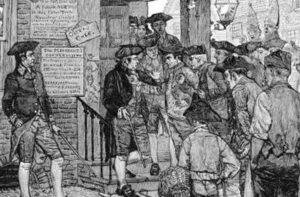
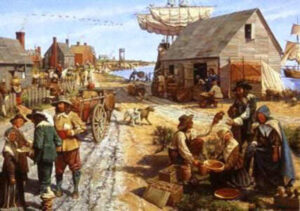 If you travel to a different area of the country or even other English-speaking areas of the world, you will find that here are different accents and even that words are used differently. Still, just because you are visiting or move to those places, doesn’t mean that you will immediately take on those accents, or their use of words. Nevertheless, when you move to a different region, your use of the language does immediately begin to evolve, whether you realize it or not, and whether it is intentional or not. The first Englishmen to set foot on American soil with the intent to colonize the land were no exception. The language began to evolve almost immediately….and it remains a fluid, almost living process to this day. “Americanisms” have been created or changed from other English terms to produce a language that very much differs from our forefathers, signifying our uniqueness and independence.
If you travel to a different area of the country or even other English-speaking areas of the world, you will find that here are different accents and even that words are used differently. Still, just because you are visiting or move to those places, doesn’t mean that you will immediately take on those accents, or their use of words. Nevertheless, when you move to a different region, your use of the language does immediately begin to evolve, whether you realize it or not, and whether it is intentional or not. The first Englishmen to set foot on American soil with the intent to colonize the land were no exception. The language began to evolve almost immediately….and it remains a fluid, almost living process to this day. “Americanisms” have been created or changed from other English terms to produce a language that very much differs from our forefathers, signifying our uniqueness and independence.
Of course, the people didn’t notice the changes right away, but by 1720, the English colonists began to notice that their language was quite different from that spoken in their Motherland. I’m sure they wondered just how that came to be? Basically, when you hear new “slang” words, and people don’t hear the accents spoken as well, the whole dynamic of the language changes. Also, very formal words like “thee, thou, and such” might become too cumbersome and so they are discarded. Everyone in the colonies knew that English would be our native language by 1790, because when the United States took its first census, there were four million Americans, 90% of whom were descendants of English colonists. So, it made perfect sense.
Nevertheless, it would not be the same as that spoken in Great Britain. The reasons are varied, but the most obvious reason was the sheer distance from England. The main way the language evolved was that over the years, many words were borrowed from the Native Americans, as well as other immigrants from France, Germany, Spain, and other countries. In addition, words that became obsolete “across the pond” continued to be utilized in the colonies. In other cases, words simply had to be created in order to explain the unfamiliar landscape, weather, animals, plants, and living conditions that these early pioneers encountered. By 1790 it was obvious that American English would be a very different language that British English.
The first “official” reference to the “American dialect” was made in 1756 by Samuel Johnson, a year after he published his Dictionary of the English Language. Johnson’s use of the term “American dialect” was not meant to simply explain the differences but rather, was intended as an insult. This “new” language was called “barbarous” and referred to our “Americanisms” as barbarisms. Because of the dissention between England and the Colonies, the British sneering at our language continued for more than a century after the Revolutionary War. They laughed and condemned as unnecessary, hundreds of American terms and phrases, but to our newly independent Americans, they were proud of their “new” American language and considered it to be another badge of independence. In 1789, Noah Webster wrote in his Dissertations on the English Language, “The reasons for American English being different than English English are simple…As an independent nation, our honor requires us to have a system of our own, in language as well as government.” In the eyes of the Colonists, that settled the matter, and when the United States was formed, the new nation was proud to be separated for the “Motherland” and would have it no other way.
Our leaders, including Thomas Jefferson and Benjamin Rush, agreed — it was not only good politics, but it was also sensible. The most atrocious changes to the British were the heavy use of contractions such as ain’t, can’t, don’t, and couldn’t. The feelings of the “rest of the world” didn’t matter to Americans, and the language changed even more during the western movement as numerous Native American and Spanish words became an everyday part of our language. The evolution of the American language continued into the 20th century and really continues even to this day. After World War I, when Americans were in a patriotic and anti-foreign mood, the state of Illinois went so far as to pass an act making the official language of the state the “American language.” In 1923, in the State of Illinois General Assembly, they passed the act stating in part, “The official language of the State of Illinois shall be known hereafter as the ‘American’ language and not as the ‘English’ 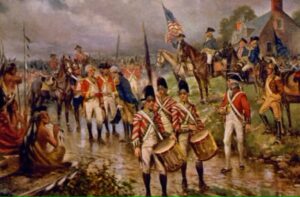
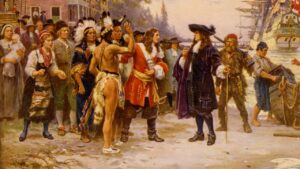 language. A similar bill was also introduced in the US House of Representatives the same year but died in committee. Ironically, after centuries of forming our ‘own’ language, the English and American versions are once again beginning to blend as movies, songs, electronics, and global traveling bring the two ‘languages’ closer together.”
language. A similar bill was also introduced in the US House of Representatives the same year but died in committee. Ironically, after centuries of forming our ‘own’ language, the English and American versions are once again beginning to blend as movies, songs, electronics, and global traveling bring the two ‘languages’ closer together.”
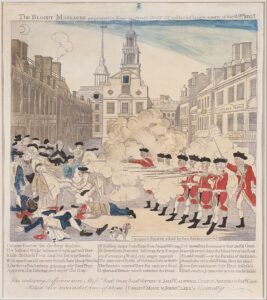 A mob of American colonists gathered at the Customs House in Boston, on the cold, snowy night of March 5, 1770. They called themselves Patriots, and they were there to protest the occupation of their city by British troops, who were sent to Boston in 1768 to enforce unpopular taxation measures passed by a British parliament that lacked American representation. I suppose it is possible that the colonists would have agreed to increase their taxes in an effort to help pay for the Seven-Year War, but the reality is that they were not asked…they were told, and it was to be forced upon them. They were not going tolerate that…so they would fight.
A mob of American colonists gathered at the Customs House in Boston, on the cold, snowy night of March 5, 1770. They called themselves Patriots, and they were there to protest the occupation of their city by British troops, who were sent to Boston in 1768 to enforce unpopular taxation measures passed by a British parliament that lacked American representation. I suppose it is possible that the colonists would have agreed to increase their taxes in an effort to help pay for the Seven-Year War, but the reality is that they were not asked…they were told, and it was to be forced upon them. They were not going tolerate that…so they would fight.
For their part, the British would also not be moved, and they were prepared to fight. British Captain Thomas Preston, the commanding officer at the Customs House, ordered his men to fix their bayonets and join the guard outside the building. The colonists…somewhat less prepared, responded by throwing snowballs and other objects at the British regulars. As the snowball fight commenced, Private Hugh Montgomery was hit, and not knowing what hit him, he discharged his rifle at the crowd. With that, the other soldiers began firing too, and when the smoke cleared, five colonists were dead or dying. They were Crispus Attucks, Patrick Carr, Samuel Gray, Samuel Maverick and James Caldwell. Three more were injured. Although it is unclear whether Crispus Attucks, an African American, was the first to fall as is commonly believed, the deaths of the five men are regarded by some historians as the first fatalities in the American Revolutionary War. After the massacre, the British soldiers were put on trial for war crimes. Strangely, patriots John Adams and Josiah Quincy agreed 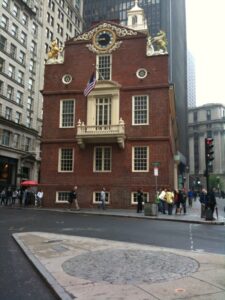 to defend the soldiers in a show of support of the colonial justice system. When the trial ended in December 1770, two of the British soldiers were found guilty of manslaughter. As punishment, their thumbs were branded with an “M” for murder. In my mind, that is such a minor punishment, for what we view as such a major crime. I’m not sure if I think that any of the British soldiers were really guilty of murder, or even manslaughter, because it seems to me that in a moment of panic, the soldier mistakenly thought he was in eminent danger, when in reality, it was simply a snowball. Still, the punishment really didn’t fit the crime for which it was given.
to defend the soldiers in a show of support of the colonial justice system. When the trial ended in December 1770, two of the British soldiers were found guilty of manslaughter. As punishment, their thumbs were branded with an “M” for murder. In my mind, that is such a minor punishment, for what we view as such a major crime. I’m not sure if I think that any of the British soldiers were really guilty of murder, or even manslaughter, because it seems to me that in a moment of panic, the soldier mistakenly thought he was in eminent danger, when in reality, it was simply a snowball. Still, the punishment really didn’t fit the crime for which it was given.
The Stamp Act was called the “Boston Massacre” by the Sons of Liberty, a Patriot group formed in 1765 to oppose it. The “Boston Massacre” was viewed as a battle for American liberty and just cause for the removal of British troops from Boston. Patriot Paul Revere made an engraving of the incident, depicting the British soldiers lining up like an organized army to suppress an idealized representation of the colonist uprising. Copies of the engraving were distributed throughout the colonies. This was to help reinforce negative American sentiments about British rule. The colonists needed as many in their ranks to be onboard with the battle, and so any depiction of the British as cruel slave masters would help.
The American Revolution officially began in April of 1775, when British troops from Boston fought with American militiamen at the battles of Lexington and Concord. The British troops were under orders to capture 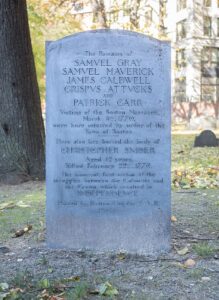 Patriot leaders Samuel Adams and John Hancock in Lexington and to confiscate the Patriot arsenal at Concord. Unfortunately for them, the Patriots were several steps ahead of them, and neither of the missions were accomplished because Paul Revere and William Dawes rode ahead of the British to warn Adams and Hancock and to rouse the Patriot minutemen.
Patriot leaders Samuel Adams and John Hancock in Lexington and to confiscate the Patriot arsenal at Concord. Unfortunately for them, the Patriots were several steps ahead of them, and neither of the missions were accomplished because Paul Revere and William Dawes rode ahead of the British to warn Adams and Hancock and to rouse the Patriot minutemen.
The British forces were forced to evacuate Boston eleven months later, in March 1776, following American General George Washington’s successful placement of fortifications and cannons on Dorchester Heights. Oddly the eight-year British occupation of Boston ended with a bloodless liberation of the city. General Washington, commander of the Continental Army, was presented with the first medal ever awarded by the Continental Congress for the victory. It would be more than five years before the Revolutionary War came to an end with British General Charles Cornwallis’ surrender to Washington at Yorktown, Virginia.
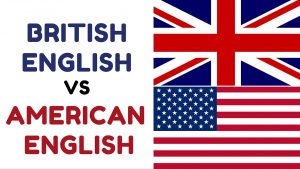 When the colonists left England to form America, they were like the younger sibling, at least when it came to language and much of how they ran the country. Nevertheless, like that younger sibling, things began to change pretty quickly. Part of the change was due simply to distance. When you don’t hear a language all the time, you begin to vary in your own speech. I didn’t really realize there was such a difference between American English and British English, other than the accent of course. Still, I noticed that more and more forms were asking which of the two I spoke. I always thought that it was an odd question, because English is English…right? Well, the correct answer is…wrong!! And when I thought about it, I knew that to be true.
When the colonists left England to form America, they were like the younger sibling, at least when it came to language and much of how they ran the country. Nevertheless, like that younger sibling, things began to change pretty quickly. Part of the change was due simply to distance. When you don’t hear a language all the time, you begin to vary in your own speech. I didn’t really realize there was such a difference between American English and British English, other than the accent of course. Still, I noticed that more and more forms were asking which of the two I spoke. I always thought that it was an odd question, because English is English…right? Well, the correct answer is…wrong!! And when I thought about it, I knew that to be true.
The changes began almost immediately after the first Englishman set foot on American soil. It all started with “Americanisms.” These “Americanisms” have been created or changed from other English terms to produce a language that differs from our forefathers, signifying our uniqueness and independence. I’m sure our founders were rather pleased with themselves with this process, if they realized it at all. By the time of the first United States census, in 1790, there were four million Americans, 90% of whom were descendants of English colonists. When I think of the speed of that growth, it strikes me as phenomenal to say the least. Because of the large English background, there was no question that our official native language would be “English,” but it would not be the same as that spoken in Great Britain. “Americanism” means a word or expression that originated in the United States. The term includes outright coinages and foreign borrowings which first became “English” in the United States, as well as older terms used in new senses first given them in American usage.
In fact, by 1720, the colonists knew that we did not speak the same language as the people in England. The most obvious reason was, of course, the sheer distance from England. Nevertheless, that was not the only 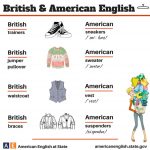 reason. Over the years, many words were borrowed from the Native Americans, as well as other immigrants from France, Germany, Spain, and other countries. We had to communicate with the people around us too, and other words that became obsolete “across the pond,” continued to be utilized in the colonies. In other cases, words simply had to be created in order to explain the unfamiliar landscape, weather, animals, plants, and living conditions that these early pioneers encountered. These things might not have existed in England.
reason. Over the years, many words were borrowed from the Native Americans, as well as other immigrants from France, Germany, Spain, and other countries. We had to communicate with the people around us too, and other words that became obsolete “across the pond,” continued to be utilized in the colonies. In other cases, words simply had to be created in order to explain the unfamiliar landscape, weather, animals, plants, and living conditions that these early pioneers encountered. These things might not have existed in England.
By 1756, the English would make the first “official” reference to the “American dialect.” Samuel Johnson made note of it a year after he published his Dictionary of the English Language. Johnson’s use of the term “American dialect” was not meant to simply explain the differences, but rather, was intended as an insult. It was rather like calling our language the “low class” version of the English language. Remember if you will, that there were those who did not think the United States should ever be a sovereign nation. Years earlier…as early as 1735, the English were calling our language “barbarous,” and referred to our “Americanisms” as barbarisms. The English sneered at our language, something that continued for more than a century after the Revolutionary War, as they laughed and condemned as unnecessary, hundreds of American terms and phrases.
Our newly independent Americans, were proud of their “new” American language, wearing it, as a badge of independence. In 1789, Noah Webster wrote in his Dissertations on the English Language: “The reasons for American English being different than English English are simple: As an independent nation, our honor requires us to have a system of our own, in language as well as government.” Our leaders, including Thomas Jefferson and Benjamin Rush, agreed. It was not only good politics, it was sensible. The feelings of the “rest of the world” didn’t matter. The language changed even more during the western movement as Native American and 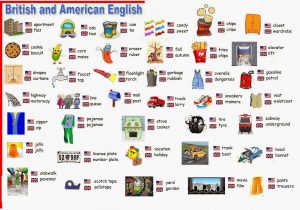 Spanish words became a part of our language.
Spanish words became a part of our language.
In 1923, the State of Illinois General Assembly, passed the act stating in part: “The official language of the State of Illinois shall be known hereafter as the “American” language and not as the “English” language.” A similar bill was also introduced in the U.S. House of Representatives the same year but died in committee. Now, after centuries of forming our “own” language, the English and American versions are once again beginning to blend as movies, songs, electronics, and global traveling bring the two “languages” closer together once again.
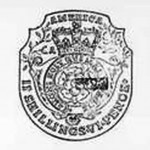 During the years that the colonies were still a part of Great Britain, it was necessary to have troops from Great Britain come and help to defend us during the French and Indian War which took place between 1754 to 1763, and Pontiac’s Rebellion from 1763 to 1764. These were quite costly wars, and to help with recuperate the losses, Great Britain enacted the Sugar Act, which while irritating to the people of the colonies, but it was hidden in the cost of import duties, and so the people accepted it. The enactment of The Stamp Act was a different story, however. The Stamp Act was a tax that Great Britain levied on just the colonies and was strongly disputed. So strongly in fact, that it led to the Revolutionary War.
During the years that the colonies were still a part of Great Britain, it was necessary to have troops from Great Britain come and help to defend us during the French and Indian War which took place between 1754 to 1763, and Pontiac’s Rebellion from 1763 to 1764. These were quite costly wars, and to help with recuperate the losses, Great Britain enacted the Sugar Act, which while irritating to the people of the colonies, but it was hidden in the cost of import duties, and so the people accepted it. The enactment of The Stamp Act was a different story, however. The Stamp Act was a tax that Great Britain levied on just the colonies and was strongly disputed. So strongly in fact, that it led to the Revolutionary War.
The Stamp Act was not what people might think it was. It was not when the use of postage stamps were first introduced. The Stamp Act went so much further than that. The Stamp Act was designed to force colonists to use special stamped paper in the printing of newspapers, pamphlets, almanacs, and playing cards, and to have a stamp embossed on all commercial and legal papers. The stamp itself displayed an image of a Tudor rose framed by the word “America” and the French phrase Honi soit qui mal y pense, meaning ”Shame to him who thinks evil of it.” Of course, the cost of said paper was high, and the colonists ere outraged. This was taxation, without representation, and it was not going to be tolerated.
Massachusetts politician Samuel Adams organized the secret Sons of Liberty organization. They planned protests against the measure, and the Virginia legislature and other colonial assemblies passed resolutions opposing the act. In October, nine colonies sent representatives to New York to attend a Stamp Act Congress, where resolutions of “rights and grievances” were framed and sent to Parliament and King George III. Their voices landed on deaf ears, and The Stamp Act was enacted on this day, November 1, 1765.
The colonists acted quickly. The arrival of the stamps to stamp the paper brought violence and economic retaliation. The colonists began a general boycott of British goods. The Sons of Liberty staged attacks on the customhouses and homes of tax collectors in Boston. The protests and economic turmoil went on for months. Finally, Benjamin Franklin appealed to the British House of Commons. Parliament took a vote, and they repealed The Stamp Act in March 1766. The same day, they made the mistake of passing Declaratory Acts, stating that the British government had free and total legislative power over the colonies.
This would prove to be their downfall. Parliament attempted to force unpopular taxation measures on the American colonies in the late 1760s. This action lead to a steady, and eventually complete, deterioration in British-American relations that brought about the outbreak of the American Revolution in 1775, and the eventual Declaration of Independence of America from Great Britain. It was a hard lesson for Great Britain to 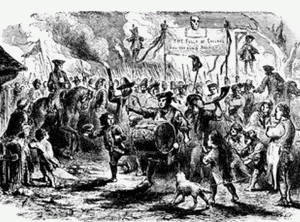 learn, and on that some political parties, namely the Democrats have not learned yet. When you tax the people too heavily, they will rebel, and the outcome will not be in the favor of that abusive government. If taxes are lower, the country will grow. Entrepreneurs will begin new ventures, and the country will prosper, and with prosperity, comes the natural process of more money to run the government. Ours is a nation of independent thinkers, and people of action. Taxes that are too high and unfair, stifle that independent thinking and slow down that action. It is just the opposite of what the proponents of a grossly obese government would expect, but it is nevertheless, the way it works. Our government would do well to realize that, and make a change.
learn, and on that some political parties, namely the Democrats have not learned yet. When you tax the people too heavily, they will rebel, and the outcome will not be in the favor of that abusive government. If taxes are lower, the country will grow. Entrepreneurs will begin new ventures, and the country will prosper, and with prosperity, comes the natural process of more money to run the government. Ours is a nation of independent thinkers, and people of action. Taxes that are too high and unfair, stifle that independent thinking and slow down that action. It is just the opposite of what the proponents of a grossly obese government would expect, but it is nevertheless, the way it works. Our government would do well to realize that, and make a change.

